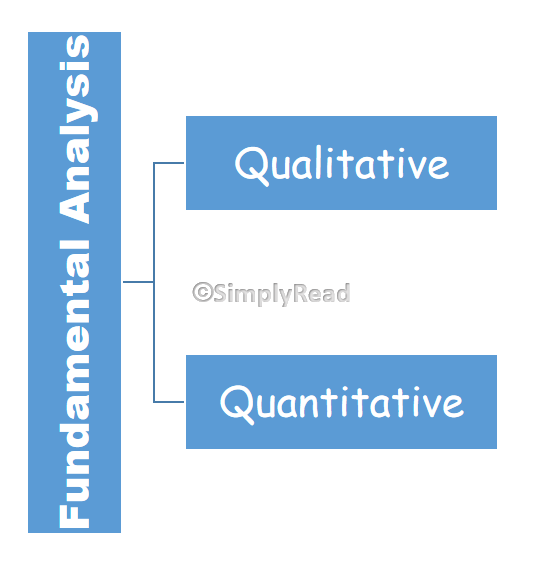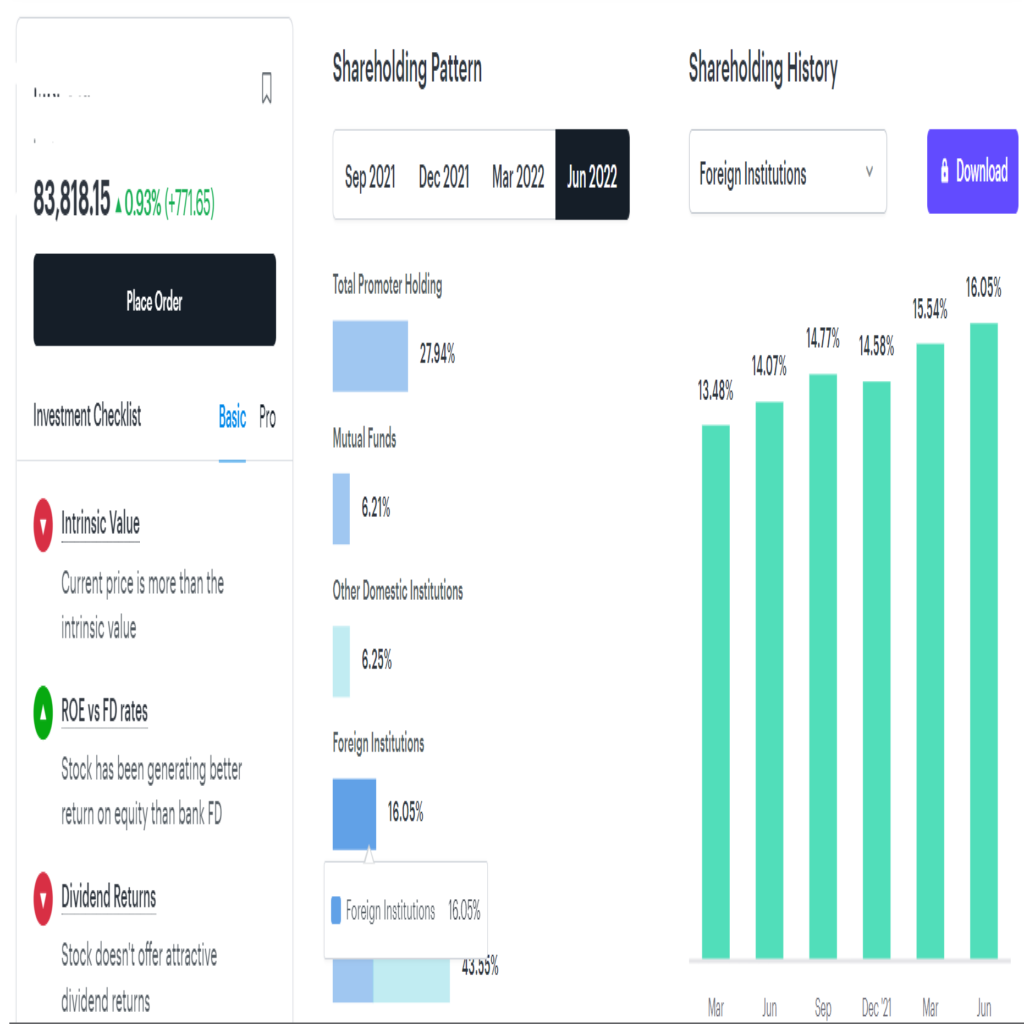Whenever we buy something, we will analyze it before buying. Let’s say you’re planning to buy a house. What are the things you’ll analyze? It will be Price/feet2, Build quality, location, etc. Because you shouldn’t end up buying an invaluable asset. Likewise, Fundamental Analysis for Equity is mandatory to analyze the stock. Also, It’s your hard-earned money and should be invested rightly. Let’s discuss Qualitative fundamental analysis this in detail.
Dear Reader, Welcome to SimplyRead. Yes, Here things are so simple!
WHAT IS FUNDAMENTAL ANALYSIS?
Fundamental means the Base or Core. Fundamental Analysis is the method of analyzing the value of the stock. Further, the value of the stock can be classified as undervalued, overvalued, or correctly valued. Simply put, Fundamental analysis is the technique to find the real worth of the stock.
Fundamental Analysis involves a lot of metrics and calculations. But, no worries. Finance experts have made these calculations in simple terms. However, we are going to discuss the overview in the article.
INTRINSIC VALUE
Intrinsic value is nothing but the true value of the stock. Also, Intrinsic value gives the investor an idea to predict the stock’s future. The investor evaluates the stock and believes that the stock can grow in the future.
For example, Consider stock A is trading at $100 but $50 is the real value of the stock. So, stock A is overvalued for this scenario. On the contrary, if A is trading at $40, the stock is undervalued. Above all, If stock A is trading exactly at $50, it is correctly valued. Therefore, the intrinsic value of Stock A is $50.
MARKET VALUE
The market Valuation of the stock is the current price of the stock trading in a live market. Also, the supply and demand forces decide the market price. It is the price where the supply quantity and demand quantity are the same. Simply put, The price changes every minute in a live market session.
CLASSIFICATION
The fundamental analysis can be broadly classified into two parts. They are Qualitative Analysis and Quantitative Analysis. However, In this article, we are going to discuss Qualitative analysis.

QUALITATIVE ANALYSIS
Qualitative Analysis is the analysis of the stock based on properties that don’t involve numbers. Moreover, the other qualitative factors such as the Annual General Meeting (AGM), Company’s announcement on dividends, leadership upgrades, etc. Simply put, the measures are taken by the company for the future welfare. Here are some of the Qualitative analyses that can be done as follows,
1.COMPANY’S MANAGEMENT
Management is the crucial aspect for a company to shine better than competitors. This includes the experience of the CEO and upper management of the company in the respective fields. Also, we should analyze the background and thoughts of the CEO/upper management. Because their vision and mission can affect the company’s growth either positively or negatively. For an instance, If a CEO doesn’t have faith in Automation or the next-gen technology he couldn’t survive the upcoming wave in the business. As a result, the company’s growth can be affected. Therefore, be aware of the management decisions.
2.BRAND VALUE
What comes to your mind when I say apple? A fruit or MAC? quite ubiquitous! Almost 70% of adults think of MAC. That's Brand!

Branding reveals the popularity and the potential of the company. However, Creating a brand is not so easy. It takes at least some decades with the fantastic performance of the company. Also, Investors can get an idea of its long existence and a positive view. Moreover, We know what Apple is capable of in the tech industry. So, without any second thought investors can decide to invest in Apple Stock.
3.BUSINESS MODEL
A Business model is the company’s core strategy/plan for the growth and function in various aspects such as revenue, Profit and loss handling, Customer base, etc., Moreover, the company should show interest in upcoming technology advancements such as Automation and robotics. A robust Business model standing out from the peer competitors makes the investors invest without a second thought.
4.DIVIDEND PAYOUT
Dividends are the company’s profits distributed among the investors based on the no of shares held by shareholders. Click here to read about equity investments. Moreover, all companies don’t need to pay a dividend. There are only a few companies that pay a good percentage of dividends. Simply put, Dividends are similar to interest earned in fixed deposits. However, it depends on the company’s performance and decision.
5.PEER COMPARISON
Peer comparison means comparing the company with its competitors. In this competitive world, every company is scaling rapidly with the latest trends and technology. Moreover, It is undeniable the company should be competitive with peers both qualitatively and quantitatively.
In India, during the early 2000 there were a lot of telecom operators such as Airtel, Vodafone, Hutch, Docomo, etc. But today, it has been narrowed down to very few operators such as Airtel, Vodafone, Idea, and Jio. Above all, Jio captured the market within a few years because of its strategies. Likewise, the stock should be compared with the peer companies and analyzed whether outperforming its peers.
6.SHAREHOLDING PATTERN
The shareholding pattern is the pattern of holding shares among the investors. Moreover, Investors can be of various types such as Retail investors, Institutional Investors (FII & DII), Mutual Funds, and Promoter holdings. It is wise to select the stocks which have merely equal shareholding patterns. Also, shareholding should be in an increasing trend when compared to previous years.

->RETAIL INVESTORS
Retail investor or Individual investor refers to the individual who invests in the stock market. Even I am a retail investor. Because I invest my earned money through my Demat account. Moreover, I am not running any financial institution. Therefore, I am a Retail investor.
->INSTITUTIONAL INVESTORS
Institutional Investors are those who make bulk transactions. Simply put, an Institutional investor buys a large number of stocks. Since Institutional Investor buys a large number of stocks this may affect the market invariably. Further, Institutional investors can be classified as Foreign Institutional Investors (FII) and Domestic Institutional Investors (DII).
- FII
Foreign Institutional Investor or FII is an investor or Financial group who belongs to a foreign nation. In other words, FII invests in securities that are outside the boundary of their residing country. Ex: US institution investing in Indian securities or the stock market. - DII
Domestic Institutional Investors or DII is the investor or Financial group who belongs to the same country in which they are residing. In other words, DII invests in securities whithate traded within their country. Ex: Indian Institution investing in Indian stock market.
->PROMOTER HOLDINGS
Promoter Holdings are the shares that belong to the management of the company. Moreover, A promoter in a company is a person who has the power of authority in the company’s welfare.
->MUTUAL FUNDS HOLDINGS
A mutual fund is a type of financial investment containing a pool of securities of the same type or different types. Moreover, An exclusive fund manager will be appointed to take care of the investments in the mutual fund. Click here to know more about Mutual Fund.
7.NEWS & EVENTS

News keeps us updated on the latest happenings in the company. Also, It helps to track the progress of the company. For an instance, we may get bad news about a company such as a steel plant destroyed in a fire accident. Further, the shareholders of the company will start selling their shares. As a result, the company’s share price will drop. Therefore, News helps the investor to be aware of what’s happening in the company. Sometimes, global news such as Union Budget, Government fund allocation to a sector, and natural disaster can affect the stocks invariably.
Events are nothing but the events which are happening within the company. Moreover, these events can be bonus announcements, Share Split, Dividend announcements, AGM meetings, Voting, etc. Additionally, the event schedule and other details will be e-mailed to the respective shareholders. Investors can watch for these announcements before taking any decision.
8.FORECAST

The forecast means foreseeing or predicting the future. This can be done by analyzing the historical data and sentiment to predict the future price of the stock. There are many analysts do forecast for a particular stock and give recommendations. Most full-service brokers provide recommendations for stocks and trading to investors. Click here to read about Demat accounts and brokerages in detail.
TO WRAP THINGS UP!
Hope you had a good read and got an overview of Qualitative Fundamental Analysis for stocks.
However, In this hurry burry world, people need all things instantly and at one stop. To get these data quickly there are private websites available such as moneycontrol, tickertape, etc. Just get an idea and do your own analysis before investing.
Also, there are courses available in NSE to understand fundamental analysis.
Let me know your queries in the comment box! So Simple!



3 comments